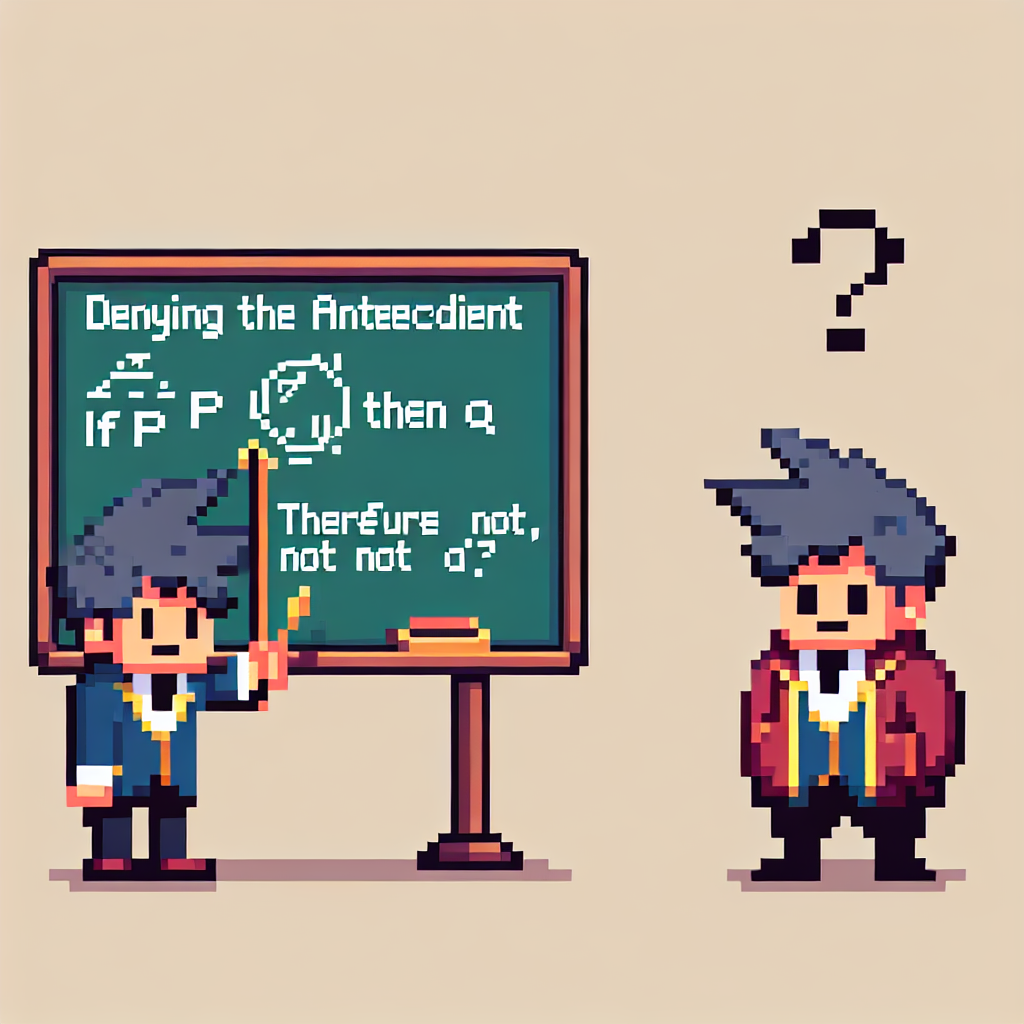Denying the Antecedent: Introduction
Explanation of Logical Fallacies
Logical fallacies are errors in reasoning that undermine the logic of an argument. They often occur when a seemingly logical statement is used to draw an incorrect conclusion. Misunderstanding these can lead to flawed arguments that seem valid but crumble under scrutiny.
Importance of Understanding Logical Errors
Recognizing logical fallacies is essential because it enhances our ability to reason correctly. When we identify these errors, we strengthen our arguments, making our discourse more robust and credible. This skill is valuable not just academically, but also in everyday discussions and decision-making processes.
Overview of “Denying the Antecedent”
One common logical fallacy is Denying the Antecedent. This involves improperly concluding something is false simply because a preceding condition is false. Additionaly, it’s crucial to understand this fallacy to avoid errors in reasoning that can lead to faulty conclusions.
Understanding Conditional Statements and Denying the Antecedent
Components of a Conditional Statement
Conditional statements form the backbone of logical reasoning, comprising an antecedent and a consequent. The structure typically follows an “If P, then Q” format, where P is the antecedent and Q is the consequent. Understanding this basic structure is vital before delving deeper into logical fallacies like Denying the Antecedent.
Example of “If P, then Q”
Consider the statement: “If it rains, then the ground will be wet.” Here, the occurrence of rain is the antecedent, while the wetness of the ground is the consequent. Despite the simplicity, this example illustrates the fundamental relationship we analyze in logical assessments. Errors often arise when one attempts to confirm or deny outcomes based on incorrect interpretations of this relationship.
Correct Ways to Validate Conditional Statements
To accurately validate a conditional statement, employ approaches like modus ponens and modus tollens. Modus ponens confirms the consequent when the antecedent is true, whereas modus tollens denies the antecedent when the consequent is false. Mastery of these methods aid in discerning valid arguments and preventing mistakes, such as the fallacy of Denying the Antecedent.
Explanation of Denying the Antecedent
Definition and Structure
The logical fallacy known as Denying the Antecedent occurs when a conclusion is improperly derived from a conditional statement. Specifically, it involves rejecting the antecedent to erroneously dismiss the consequent. The fallacy often takes the form: “If P, then Q. Not P, therefore not Q.”
Common Misinterpretation
Despite its seemingly clear structure, Denying the Antecedent is a frequently misunderstood fallacy. Many people assume there is a straightforward correlation between the antecedent and consequent, believing that if the former is false, the latter must also be false. However, this mistake overlooks other conditions that could satisfy the resultant state.
Real-Life Examples of the Fallacy
Consider a scenario where someone might argue, “If it rains, the ground will be wet. It didn’t rain; therefore, the ground is not wet.” This overlooks alternate explanations, such as a sprinkler system, that could explain the wet ground. By acknowledging this logical misstep, one can begin to recognize the fallacy in everyday reasoning.
Why Denying the Antecedent is a Fallacy
Logical Breakdown of the Fallacy
The logical structure of Denying the Antecedent involves a conditional statement, often structured as “If P, then Q.” It follows with the negation of the antecedent, leading to the erroneous conclusion that the consequent must also be false. Despite appearing logical on the surface, this form of reasoning fails because the truth of “Q” is not solely dependent on the truth of “P.” Additional conditions could make “Q” true, even if “P” is false, which is crucial for accurate reasoning.
Illustrations of the Error in Reasoning
Consider the following illustration: “If it rains, the ground will be wet. It is not raining; therefore, the ground is not wet.” This reasoning is flawed. During moments when the ground has been watered by sprinklers, it still becomes wet without the presence of rain. This helps underscore the problem, highlighting why relying on Denying the Antecedent can lead to inaccurate conclusions.
Consequences of Mistakenly Using this Fallacy
Employing this fallacy can result in critical misjudgments, affecting various contexts, from academic theories to everyday life decisions. Because decisions are often based on logical premises, falling prey to this reasoning imperfection can lead to misguided outcomes and hinder effective problem-solving. Thus, awareness and understanding of this fallacy are essential to maintaining sound reasoning and avoiding unnecessary errors in judgment and analysis.
Implications of Denying the Antecedent in Various Fields
Impact on Scientific Hypotheses
In the realm of science, the fallacy of Denying the Antecedent poses a significant threat to the integrity of hypothesis testing. Scientists often rely on conditional statements to form predictions about their experiments. However, if researchers fall into the trap of this logical error, they might unjustly disregard a potentially valid hypothesis. Such an oversight happens because they focus solely on one factor, neglecting alternative explanations. Thus, maintaining a clear understanding of logical principles is crucial for scientific accuracy.
Effect on Legal Reasoning
The legal field can also be compromised by mistakes involving Denying the Antecedent. Lawyers and judges frequently encounter conditional arguments while assessing cases. Although the complexity of legal reasoning can be daunting, falling into this fallacy can lead to unjust verdicts. Additionally, this error might result in the dismissal of viable legal strategies, thereby affecting case outcomes. Analyzing each argument with care helps mitigate such consequences.
Role in Everyday Decision Making
Beyond professional environments, Denying the Antecedent has implications on our daily decision-making processes. Individuals might unknowingly fall victim to this fallacy during routine judgment calls. For instance, one may mistakenly assume that the absence of a particular condition automatically negates an outcome. Despite our best intentions, such reasoning can lead to flawed conclusions. Therefore, honing critical thinking skills is essential for making sound decisions in everyday life.
How to Avoid Denying the Antecedent
Strategies for Identifying the Fallacy
Understanding how to identify Denying the Antecedent is crucial for avoiding errors in reasoning. Begin by analyzing the structure of conditional statements. Focus on the antecedent and consequent to discern potential flaws in logic. If you notice that an argument falsely assumes the negation of the antecedent means the negation of the consequent, then you have likely identified the fallacy. To aid this process, regularly practice dissecting arguments to spot inconsistencies in logical flow. Additionally, keep an eye out for assumptions not explicitly supported by evidence, because they often lead to fallacious reasoning.
Techniques for Constructing Valid Arguments
Constructing valid arguments requires careful attention to the logical connections between statements. Start by ensuring that your premises provide clear support for the conclusion. In conditional reasoning, use appropriate logical patterns such as Modus Ponens and Modus Tollens, each of which correctly articulates the relationships between antecedent and consequent. Despite the temptation to jump to conclusions when the antecedent is denied, resist the urge. Instead, evaluate how the premises uphold the conclusion without ignoring alternative explanations. During this process, clarity and precision are your allies; they will help delineate sound from unsound conclusions.
Practice Examples for Skill Building
Improving your ability to identify and avoid Denying the Antecedent can be achieved through consistent practice. Engage with exercises designed to test your understanding of logical statements. For example, create scenarios involving conditional arguments, and practice rewriting fallacious ones into valid forms. Study examples from various fields where logical rigor is paramount, then analyze how errors occur and how they might be corrected. By refining these skills, you fortify your capacity to construct and evaluate arguments logically and responsibly. Consequently, your decision-making skills in everyday life will become more accurate and reliable.
Enhancing Critical Thinking Skills: Addressing Denying the Antecedent Through a Case Study
Case Study Overview
During a weekly strategic meeting, Emily, a project manager at a tech company, faced a challenging logical fallacy. Her team was discussing a potential software upgrade, and one of her colleagues argued that if the new system was implemented, there would be improved efficiency. Despite the system not being implemented, he concluded there would be no efficiency gains. This is a classic example of the Denying the Antecedent fallacy, where the conclusion is improperly drawn from the negation of the initial condition.
Logical Analysis and Solution
Recognizing the fallacy is crucial in such scenarios. Emily realized the mistake and explained that just because the new system wasn’t implemented, it didn’t necessarily mean there couldn’t be other avenues for efficiency gains. She emphasized the importance of identifying valid alternatives. By highlighting these options, such as process optimization and employee training, Emily demonstrated the ability to construct a more robust argument. Additionally, she encouraged her team to practice similar problem-solving methods to avoid such logical pitfalls in future discussions.
Encouragement for Continuous Learning
Emily’s experience underscores the importance of ongoing education in critical thinking and logical reasoning. She recommended resources such as workshops and online courses dedicated to improving these skills. Because logical analysis is pivotal in various fields, developing this expertise allows individuals to navigate complex problems more effectively. Moreover, fostering an environment of continuous learning helps teams to challenge assumptions and avoid errors like Denying the Antecedent. This approach not only enhances individual capabilities but also strengthens collaborative efforts.

